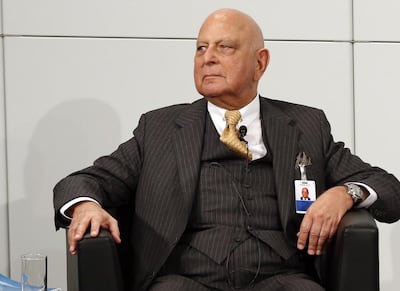In London, in the mid to late 1990s, the only Arab financial company that was spoken of with reverence was Investcorp. By then it had been involved in iconic deals for luxury brands such as Tiffany & Co and Gucci, rejuvenating them and then taking them public at enormous profit. It outbid future US President Donald Trump to acquire Tiffany's in 1984 and netted $1 billion profit from Gucci. Understandably, Iraqi founder Nemir Kirdar, a former Chase banker, became a legend in financial circles.
In 1982, he had started off with an idea to put the money of wealthy Gulf merchant families into companies in the US which had lost some of their lustre as they changed hands from one generation to the next. The Gulf at that time was akin to Silicon Valley in terms of concentration of investors, and Investcorp offered them from their home base the kind of access to good private equity deals that they would usually have to be in New York to get.
This was underpinned by principles of professionalism and strong management, which Investcorp pioneered in the Arabian Gulf's financial sector. Its example has inspired many institutions since to follow the path it trailblazed. Investcorp's ability to raise money from investors in the Gulf consistently for decades puts it at the very pinnacle of the industry. Many huge Wall Street and City of London names have found their experience of fund raising in the region far more frustrating. Investcorp has been able to tailor a peerless capital raising approach. As one ex-banker told me, "I always take my cue from what Investcorp are doing".
In the past six years in particular, under executive chairman Mohammed Alardhi, Investcorp has leveraged its dominant regional position to become a global private equity company. Its expanded investor base is now institutionally-led, including sovereign wealth funds, and spread across continents, including Asia. While its legacy on New York's Fifth Avenue remains the most well-known (fashion designer Tom Ford came to prominence at Gucci under its watch), Investcorp's more than 150 deals have also spanned other sectors, including property and technology. It has a dozen offices, including in Beijing, New York and Switzerland. However, its roots are in the Gulf and Bahrain, where its headquarters will remain, even though its shares will no longer be listed on the local stock exchange. In many ways, this decision is also true to its heritage. As a company that has always been management led, rather unique for a region where many businesses are run by shareholders and owners, no longer being publicly listed will allow its leadership to be even more focused on growth and increasing Investcorp's value.
Since its early days under Mr Kirdar, Investcorp has valued good practice, governance and processes. This discipline has been key to its sustained success. Recently, and in a short space of time, it has tripled its assets under management to $35 billion. In 2019, Mr Alardhi told me in Davos that the target is $50bn. In the 1980s and right up until the financial crisis a decade ago, being publicly listed supported good governance and management discipline, as well as providing the most efficient access to liquidity to fuel growth.
Today, it can be argued convincingly that being a publicly listed company anywhere in the world is more of a distraction for management than a strength. The impact of social media and platforms such as the Robinhood trading app on stock markets has been to increase volatility and undermine investor confidence. In any case, companies that want to go public now are more likely to do so under the more controlled conditions of a special purpose acquisition company than an actual initial public offering. It is unlikely that any observers will see not being listed as a disadvantage for Investcorp.
In fact, freed of the burden of periodic market reporting, the ability of its management to pursue opportunities will be enhanced. Ultimately, more time spent on growing the business will be good for shareholder value.
The decision to delist was backed unanimously by its shareholders and hardly any will sell their holdings, it is understood. In any case, the original shareholders from the 1980s pass on their interests in Investcorp from one generation to the next, like a family heirloom.
It has been almost 40 years since Investcorp was launched as a pioneering private equity company. It now describes itself as "a leading global manager of alternative investments", having said it learnt from every deal and each period of market turmoil. It has also experienced a smooth succession from founder to the next generation of management. Mr Kirdar passed away last year, aged 83, but he had already handed over the reins in 2017.
This typified a culture of long-sightedness, which has helped build the company’s resilience. During the Covid-19 pandemic, Investcorp was able to absorb the shocks and increase its profit in the six months to December 31, 2020, because its global and diversified scale allowed it to take advantage of the recovery in Asia.
The next period holds much promise too. For example, three companies working on Expo 2020 Dubai are part of Investcorp's portfolio. The Expo's tag line is "connecting minds, creating the future". Investcorp's unofficial motto might be "always connected to the future".





